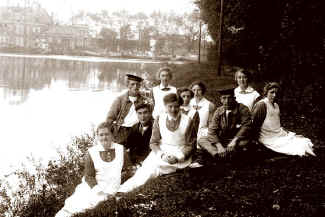|
to
English Camp page
next page
|
The escape by John Henry
Bentham (2)
The English Camp in Groningen 1914 -1918
(part 11)
This is the eleventh article out of a series of 13 on the history of the English Camp in Groningen, Holland, where 1,500 British servicemen were interned during the Great War.
 |
| An
unusual picture. An epidemic of scarlet fever broke out in the
English Camp in 1917. Sick Britons were put into quarantine huts
in the grounds of the Academic Hospital in Groningen. This picture
was taken in memory of that picture. The man to the right over the
picture is seaman Townsend. Note the special gray blue uniforms
that these servicemen always wore during a stay in hospital. (Courtesy
H.J.Smit - Groningen) |
After what seemed like an eternity, the key was turned again. Instead of the expected police, the proprietor entered, alone. He said straightaway: “You are escaped sailors out of Groningen'. He then explained what his duty was, and that the police would give him 18 guilders per man for turning in escapees. On an impulse, Bentham decided to try a bribe, and offered the proprietor 50 guilders for him to keep quiet. He took the bait and accepted 25 guilders to start, and took them upstairs again. The man then left the room again and locked it, ostensibly to protect them. Would he now double-cross them and rake in 36 guilders from the police? It turned out that he was going to keep his word, as was customary with the Dutch. (Quote from John Bentham).
The following morning, they had a good breakfast, and the hotelier gave extensive instructions how to reach the railway station. John bought two tickets, which turned out to be returns, which cost a lot of money. They then bought two German newspapers, walked to the platform and boarded the first southbound train. They pretended to sleep, to avoid conversation with other passengers. The train halted at Utrecht, where nearly everybody changed. They dared not ask any questions. They remained seated on the train, very tense, also because of the number of police officers on the platform. They finally arrived in Amsterdam, where they walked into the city. Suddenly Bentham saw a sign saying 'Bells Asbestos Co'. The two entered the property and asked the Englishman behind the counter if they could have a word. They explained to this Mr Pearson who they were, which rather gave him a fright. He explained that if he were caught helping them to escape he could be expelled. He was nonetheless very willing to help his fellow countrymen and took them to the British Consul.
The Consul’s reaction was one of great annoyance, and he did not want anything to do with their illegal flight. He told them to leave at once, or he would call the police. Bentham was furious and called him a ‘useless fellow’, upon which they took their leave. Mr Pearson gave them a square meal, after which the escapees went to Rotterdam, as no ships left for England out of Amsterdam. Mr Pearson brought them to the railway station, where Bentham bought two single tickets. They arrived in Rotterdam at 6pm, where they took the first available tram, which luckily took them straight to the harbour. They noticed that the entry to the harbour was guarded heavily. Fortunately, an old man came past who was pushing a large, heavily laden barrow to the ship that they wished to board. They pushed their caps into their eyes and pushed the cart past the guards to SS ‘Cromer’, ran up the gangway and disappeared into the ship, where they were met with cheers by the crew. Captain Barton was more than pleased to take them; he would receive a £5 premium for every man he took across.
John and Alex would be allowed on board, dressed as stokers. At midnight, Dutch customs came on board and searched the vessel before it sailed, but the men were not discovered. The ‘Cromer’ arrived at Harwich at 3pm the next day. They reported on board the RN ship ‘Maidstone’, where the Captain gave them a cordial welcome, a whisky and soda and a rail ticket to London. They were ordered to report to HQ Royal Naval Division in London.
Bentham’s family was not that pleased to see him back. His father said that he would have been safe in Holland, and he would now end up in that mess again. John Henry Bentham survived the war; his friend Alex died in an accident in 1917.
Next: Nine British servicemen lie buried at Groningen
  to
English Camp page to
English Camp page
|
|